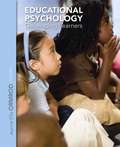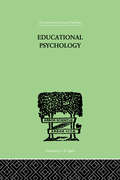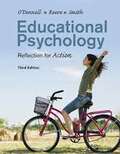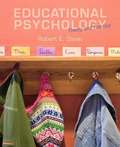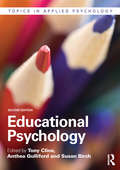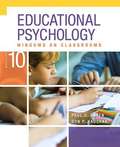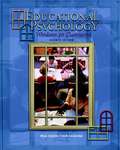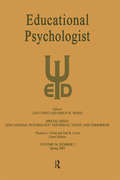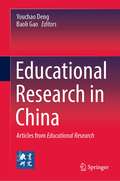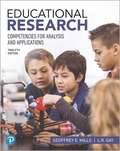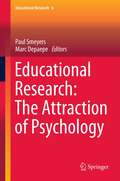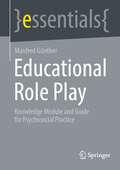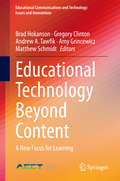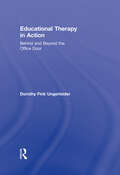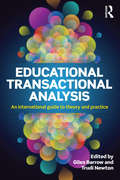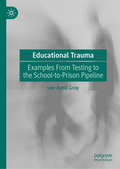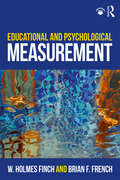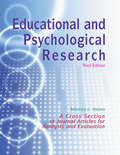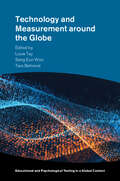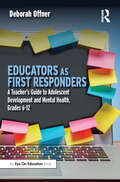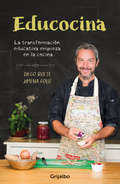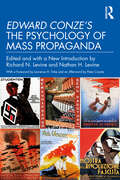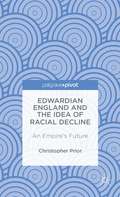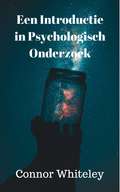- Table View
- List View
Educational Psychology: Developing Learners (Eighth Edition)
by Jeanne Ellis OrmrodEducational Psychology: Developing Learners is known for its exceptionally clear and engaging writing, its in-depth focus on learning, and its extensive concrete applications. Its unique approach helps students understand concepts by examining their own learning and then showing them how to apply these concepts as teachers. More than any other educational psychology text, this text moves seamlessly between theory and applications, features the most extensive and integrated coverage of diversity, contexts of learning, neuropsychology and brain development, and classroom applications of technology. It includes innumerable concrete examples to help readers connect educational psychology to real children and classrooms. From reviews of the book: "Rather than simply presenting the necessary content, the author makes you feel like she is talking directly to you. . . . I love that diversity that has been woven throughout the fabric of this text. . . . Ormrod's personalized writing style will reach undergraduate students in a way that few authors can. [The book] is concise, yet thorough; comprehensive, yet unpretentious. " --Angela Bloomquist, California University of Pennsylvania 'Compared to other texts, Ormrod's text is written in a more accessible way. . . . Strengths [include] accessibility, good use of supplementary materials, [and] updated research. " --David Yun Dai, University at Albany, SUNY "Love how each chapter discusses diversity and special needs! . . . Most students keep this text throughout their teaching careers as a resource. Of all the educational psychology textbooks that I've used, this one is the most comprehensive and interactive with vivid examples. . . . The supplemental materials are very useful. The power point is extensive and easy to use for lecture. I use the test bank materials and find the questions to be aligned with students' licensure exams. " --Cindy Ballantyne, Northern Arizona University Note: MyEducationLab does not come automatically packaged with this text. To purchase MyEducationLab, please visit: www. myeducationlab. com or you can purchase a valuepack of the physical text + MyEducationLab.
Educational Psychology: Its problems and methods (International Library Of Psychology Ser.)
by Fox, CharlesFirst published in 1999. Routledge is an imprint of Taylor & Francis, an informa company.
Educational Psychology: Reflection for Action
by Jeffrey K. Smith Angela M. O'Donnell Johnmarshall ReeveTeachers help students learn, develop, and realize their potential. To become successful in their craft, teachers need to learn how to establish high-quality relationships with their students, and they need to learn how to implement instructional strategies that promote students' learning, development, and potential. To prepare pre-service teachers for the profession, the study of educational psychology can help them to better understand their students and better understand their process of teaching. Such is the twofold purpose of Educational Psychology – to help pre-service teachers understand their future students better and to help them understand all aspects of the teaching-learning situation. The pursuit of these two purposes leads to the ultimate goal of this text – namely, to help pre-service teachers become increasingly able to promote student learning, development, and potential when it becomes their turn to step into the classroom and take full-time responsibility for their own classes.
Educational Psychology: Theory and Practice
by Robert E. SlavinEducational Psychology: Theory and Practice gives tomorrow's teachers the intellectual grounding and practical strategies they need to be effective instructors. Complete, up-to-date information is presented in readable, practical ways and illustrated with engaging examples, case studies, and embedded videos and interactive activities. The text makes the connection between theory and practice explicit, helping students to transfer what they learn to their own teaching.
Educational Psychology: Topics In Applied Psychology (Topics in Applied Psychology)
by Tony Cline Anthea Gulliford Susan BirchEducational Psychology, Second Edition offers a comprehensive overview of how key advances in social, developmental and cognitive psychology impact upon the role of educational psychologists working today. Written by leading researchers, the book also explores controversies and dilemmas in both research and practice, providing students with a balanced and cutting-edge introduction to both the field and the profession. Fully revised throughout, the new edition is written to encourage students to integrate their understanding of core psychological disciplines, as well as to consider what ‘evidence-based practice’ really means. Organized into two broad sections related to learning and behaviour, the book features a selection of vignettes from educational psychologists working in a range of contexts, as well as tasks and scenarios to support a problem-orientated approach to study. By integrating both research and everyday practice, the book is unique in engaging a critical appreciation of both the possibilities and limitations of educational psychology. It is the ideal book for any student wishing to engage with this important and evolving field of study.
Educational Psychology: Windows On Classrooms (Tenth Edition)
by Don Kauchak Paul EggenThis significantly revised Tenth Edition focuses on applying theories and research in educational psychology to an educator’s work in the classroom. The content has been updated to reflect the most current research and trends in the field and in K-12 classrooms, yet care has been taken to preserve the essential applied nature of this text. Using an integrated-case approach, authors Eggen and Kauchak begin each chapter with a case study taken from actual classroom practice, and then weave the case throughout the chapter, extracting specific illustrations and, in some instances, using dialogue directly from the case to emphasize the application of chapter content to the classroom setting. Many additional concrete examples taken from both classrooms and daily living further illustrate the content of each chapter in a comprehensive and approachable manner.
Educational Psychology: Windows on Classrooms, 7th Edition
by Paul D. Eggen Donald P. KauchakFor courses in Introduction to Educational Psychology. Long recognized as very applied and practical, Eggen and Kauchak's Educational Psychology: Windows on Classrooms, seventh edition is now even more applied and concise, giving students exactly what they need to know in the course. The author's hallmark cases remain, in both written and videotape format, to introduce real-world applications in a way that no other text can. Along with expanded applications to diversity (urban, suburban, and rural areas), technology, and a new pedagogical system that completely restructures how information is delivered in the book and will help students really understand what they should be getting out of every single chapter. Educational Psychology: Windows on Classrooms once again truly fulfills the promise of its title, giving students a "window" on the classrooms in which they will someday teach.
Educational Psychology: Yesterday, Today, and Tomorrow: A Special Issue of Educational Psychologist
by Lyn Corno Philip H. WinneFirst published in 2001. Routledge is an imprint of Taylor & Francis, an informa company.
Educational Research in China: Articles from Educational Research
by Youchao Deng Baoli GaoThe articles in this book are from Educational Research—the top academic journal in the field of education research in China. It covers education theory and philosophy, basic education, education economy and management and other fields, focusing on the hot and frontier issues of Education in China 2019, such as the development of artificial intelligence and education, the contribution of education to green GDP, rural education teams and policies, vocational education development, and so on.Educational researchers in the college and university, educational policy makers and frontline teaching staff would be interested in it. By focusing on the current hot issues and frontier education issues, the book explores the deep theoretical basis behind the phenomenon, so as to establish in the reader’s mind the connections between theory and practice, China and world.
Educational Research: Competencies for Analysis and Applications
by L. R. Gay Geoffrey Mills<p>Educational Research: Competencies for Analysis and Applications uses engaging, straightforward language to introduce students to the information and skills required to successfully conduct research and to competently evaluate research. Long known for their clear and at times humorous writing, the authors are accessible and thoughtful guides for readers who are being introduced for the first time to a field that many of them might find initially intimidating. The text provides a total instructional system that lays out clear learning targets and then supports students as they practice and develop expertise in both doing and reading research. <p>The 12th Edition includes a new, separate chapter on ethics, expands its coverage of single-subject research, covers the latest digital strategies and tools for doing research, and introduces students to the open source statistics software R.</p>
Educational Research: The Attraction of Psychology
by Paul Smeyers Marc DepaepeThe closely argued and provocative contributions to this volume challenge psychology's hegemony as an interpretive paradigm in a range of social contexts such as education and child development. They start from the core observation that modern psychology has successfully penetrated numerous domains of society in its quest to develop a properly scientific methodology for analyzing the human mind and behaviour. For example, educational psychology continues to hold a central position in the curricula of trainee teachers in the US, while the language of developmental psychology holds primal sway over our understanding of childrearing and the parent-child relationship. Questioning the default position of modern psychology as a way of conceptualizing human relations, this collection of papers reexamines key assumptions that include psychology's self-image as a 'scientific' discipline. Authors also argue that the dogma of neuropsychology in education has demoted concepts such as 'emotion', 'feeling' and 'relationship', so that they are now 'blind spots' in educational theory. Other chapters offer a cautionary analysis of how misshapen notions of psychology can legitimize eugenics (as in Nazi Germany) and poison racial attitudes. Above all, has psychology, with its focus on individual merit, been complicit in hiding the impacts of power and privilege in education? This bracing new volume adopts a broader definition of education and childrearing that admits the essential contribution of the humanities to the proper study of mankind. This publication, as well as the ones that are mentioned in the preliminary pages of this work, were realized by the Research Community (FWO Vlaanderen / Research Foundation Flanders, Belgium) Philosophy and History of the Discipline of Education: Faces and Spaces of Educational Research.
Educational Role Play: Knowledge Module and Guide for Psychosocial Practice (essentials)
by Manfred GüntherIn this springer essential book, Manfred Günther impressively describes educational role play. He shows how it emerged in the 1970s as a new, guided method. Pedagogical role play developed as a VT-based project that is great fun to use in practice and that can effortlessly transfer desired competencies in a pedagogical sense. This is because, across cultures, play is often about practicing important social skills or also about working through issues or conflicts.
Educational Technology Beyond Content: A New Focus for Learning (Educational Communications and Technology: Issues and Innovations)
by Brad Hokanson Gregory Clinton Andrew A. Tawfik Amy Grincewicz Matthew SchmidtThis book is the outcome of a research symposium sponsored by the Association for Educational Communications and Technology [AECT]. Consisting of twenty-four chapters, including an introduction and conclusion, it argues that informational content should not be the main element of education, and that to provide more for learners, it is necessary to go beyond content and address other skills and capabilities. It also discusses the false premise that learning is complete when the information is known, not when learners seek more: their own directions, answers, and ideas. The authors assert that the ability to synthesize, solve problems and generate ideas is not based on specific content, although education often focuses solely on teaching content. Further, they state that content can be separated from the learning process and that instructional design and educational technology must be about the skills, habits, and beliefs to be learned.
Educational Therapy in Action: Behind and Beyond the Office Door
by Dorothy Fink UngerleiderThis book provides an in-depth look at what a little-known clinician, the educational therapist, does and how they do it. It goes behind the clinician’s door to illustrate the unusual and broad range of interventions – both academic/vocational and social/emotional – that an educational therapist employs. This particular case study involves a young woman named Nora who had a severe but undiagnosed auditory processing disorder. She could not give meaning to the spoken language that came at her too rapidly, leaving her in a constant fog of words that she couldn’t comprehend. This case discloses the problems, their causes, and the emotional toll that had to be considered when developing an effective educational/therapeutic plan for Nora. It vividly illustrates the dynamic exchanges and mutual learning that goes on between client and therapist. Parts I and II illustrate how the psycho-educational interventions that addressed Nora’s academic and non-academic needs were gradually formulated over the first year. Part III provides a series of vignettes from subsequent years that illustrate the ongoing applications of the therapist’s work. Distinguishing Features Explanatory Sidebars – The rationale behind particular techniques and interventions is clarified through a system of explanatory sidebars that inform the reader without distracting from the story. This approach makes the book both an instructional tool well as compelling story. Organic Curriculum – The rationale for and application of an "organic (personalized) curriculum" is explained and applied throughout the book as a model for others to use in working with this population. A Longitudinal Perspective – The initial work with Nora began many years ago, so this book provides a long view of her life and tracks the influences that educational therapy exerted on her development into a fully functioning adult. Cognitive/Emotional Integration – The core of educational therapy – the interdependence of cognitive skills and emotional response – is clearly documented throughout the book. In addition to educational therapy students and practitioners, this book is appropriate for those working in related fields such as special education, school psychology, school counselling, and social work in educational settings.
Educational Transactional Analysis: An international guide to theory and practice
by Giles Barrow Trudi NewtonWhile there are a small number of titles exploring Transactional Analysis in specific educational settings, there is no comprehensive account of this practical psychology for learning. Educational Transactional Analysis draws together a team of contributors from the international educational TA community, offering perspectives from Europe, India, South Africa, Australia, Japan and the United States to explain and illustrate the practice of this exciting development in education. Establishing a seminal overview that will make it the ‘go to’ text, the book covers four key sections: Philosophy, Politics, Principles & Educational Transactional Analysis The Identity of the Teacher Educational Transactional Analysis and Schooling Educational Transactional Analysis: Adult learning and community development Aimed at educators in all contexts, researchers, students and trainers, this book will be an essential resource for those that wish to deepen their understanding of educational TA or are involved in formal TA training.
Educational Trauma: Examples From Testing to the School-to-Prison Pipeline
by Lee-Anne GrayThis book deconstructs and analyzes the impact of education-based trauma. Drawing on wisdom from the fields of education, psychology, neuroscience, history, political science, social justice, and philosophy, Gray connects the dots across different forms of education trauma that can occur throughout a student’s life: from bullying and anxiety to social inequity and the school-to-prison pipeline. With respect to learning, memory, social group dynamics, democracy, and mental health, this book serves as a call-to-arms, demanding civil rights for all students and for education to fulfill its ultimate duty as a force for the common good.
Educational and Psychological Measurement
by W. Holmes Finch Brian F. FrenchThis new text provides the most current coverage of measurement and psychometrics in a single volume. Authors W. Holmes Finch and Brian F. French first review the basics of psychometrics and measurement, before moving on to more complex topics such as equating and scaling, item response theory, standard setting, and computer adaptive testing. Also included are discussions of cutting-edge topics utilized by practitioners in the field, such as automated test development, game-based assessment, and automated test scoring. This book is ideal for use as a primary text for graduate-level psychometrics/measurement courses, as well as for researchers in need of a broad resource for understanding test theory.
Educational and Psychological Research: A Cross-Section of Journal Articles for Analysis and Evaluation
by Mildred L Patten• This edition of our popular reader is entirely updated with timely articles that deal with broad issues in education and psychology. (For a research reader with emphasis on classroom issues, see A Cross Section of Educational Research.) • This collection shows students the many inherent weaknesses of empirical methods as well as models of excellence. Unlike research readers that contain made-up articles, this one has both face validity and content validity. Your students will appreciate reading real articles with real results. • The 34 research articles illustrate: •qualitative research•combined qualitative/quantitative research•content/documentary analysis•correlational research•test validity and reliability research•causal-comparative research•true experimental research•quasi-experimental research•pre-experimental research•program evaluation•meta-analysis • The lines are numbered sequentially, making it easy to refer to specific parts of each article during classroom discussions. • This single source of research articles is convenient for you and your students. • Easy to coordinate with any research methods text, this reader is an ideal way to make research methods come alive! Field-tested for student interest and comprehension. • All major methods of research are illustrated with real research articles drawn from a wide variety of journals. (See Table of Contents.) • Your students will become familiar with a wide variety of writing and organizational styles that real researchers use. Despite their variety, all articles in this book are highly comprehensible. • Factual Questions at the end of each article encourage students to read for mythological points they might otherwise overlook. • Questions for Discussion encourage students to address broad issues of research design. An instructor’s answer key will be shipped with your examination copy. • The interesting research topics will make your students look forward to doing their research reading homework.
Educational and Psychological Testing in a Global Context: Technology and Measurement around the Globe (Educational And Psychological Testing In A Global Context Ser.)
by Louis Tay Sang Eun Woo Tara BehrendEducators as First Responders: A Teacher’s Guide to Adolescent Development and Mental Health, Grades 6-12
by Deborah OffnerEducators as First Responders is a comprehensive, hands-on guide to adolescent development and mental health for teachers and other educators of students in grades 6-12. Today’s schools are at the forefront of supporting adolescents with increasingly complex, challenging psychosocial needs. Moreover, students are more likely to seek out a trusted teacher, advisor, or coach for support than to confide directly in a parent or even a school counselor. Succinct and accessible, this book provides tips and strategies that teachers, coaches, nurses, counselors, and other school professionals can put into immediate use with students in varying degrees of distress. These evidence-based practices and real-world classroom examples will help you understand the “whole student,” a developing individual shaped not just by parental pressure or psychiatric diagnosis but by school and broader cultural and systemic forces.
Educocina: La transformación educativa empieza en la cocina
by Diego Ruete Jimena FolleTexto invaluable a la hora de emprender el camino hacia una alimentación saludable como forma de vida. Los adultos transmitimos mucho más de lo que decimos, por esto necesitamos asumir el rol que cumplimos en la educación alimentaria en la infancia. Necesitamos adultos que se detengan, que lean las etiquetas, que sean críticos a la hora de comprar alimentos, que se interesen más por el contenido que por el envoltorio, que se animen a cocinar más. Para lograr esto necesitamos reaprender a organizar nuestras jornadas, a rearmar nuestras prioridades y, sobre todo, las de nuestros niños. En este libro, Diego Ruete apela a su enorme experiencia como educador para compartir con nosotros estrategias que nos ayudarán en el camino hacia la alimentación como forma de compartir el amor. El libro se enriquece con la solidez conceptual de Jimena Folle y los aportes de reconocidos especialistas en diversas áreas que, junto con la exitosa praxis de Diego Ruete y de Inés Marracos, conforman un texto invaluable a la hora de emprender el camino hacia una alimentación saludable como forma de vida. En una sociedad donde aparecen como consumibles cada vez más cosas que en realidad no son alimentos, la educación alimentaria juega un rol esencial. La comida debe retornar a hacer su verdadero trabajo, debe nutrir para el desarrollo, debe aportar para la salud, no enfermar. En estas páginas encontraremos conceptos, consejos y herramientas que contribuirán a reconectarnos con los alimentos de una manera saludable.
Edward Conze's The Psychology of Mass Propaganda
by Richard N. Levine Nathan H. LevineEdward Conze’s The Psychology of Mass Propaganda presents a commentary on the psychology of propaganda during the rise of fascism in Europe in the 1930s. It discusses the conditions which generate vulnerability to misinformation in human societies, and thus offers insight into how propaganda may be "withstood." Completed in 1939, during the period of Conze’s own inflection from Marxist philosophy to Buddhist studies, the original manuscript was never published and is now in print for the first time. Presenting a unique historical perspective, while also appealing to an acutely topical interest in the conditions under which autocracy and fascism arise, the book examines the psychology of mass propaganda through copious contemporary and historical examples. Conze focuses especially on recent news articles and the statements of the propagandists of many of the governments that would go on to participate in the Second World War, including Germany, Italy, the USSR, USA and UK, all of which he interprets through the lens of recent psychological and historical research. The book has been edited and includes a new introduction by Richard N. Levine and Nathan H. Levine, also featuring a foreword by American legal scholar Laurence H. Tribe, and an afterword by actor, director, writer, and Buddhist priest Peter Coyote. This is a fascinating opportunity for scholars across several disciplines, including political scientists and psychologists, historians and sociologists, to access one of Conze’s previously unpublished works. It will also be of importance to those interested in Conze’s work on Buddhist philosophy, and in the psychology of propaganda more broadly.
Edwardian England and the Idea of Racial Decline: An Empire’s Future
by Christopher PriorEmerging from a long and exhausting conflict against the Boers in South Africa, Edwardians are often perceived as rocked by a profound set of doubts about the future of the British Empire. Drawing upon a wide range of popular sources, this study considers the level of middle-class engagement with such strains of pessimistic thought.
Edwards’ Treatment of Drinking Problems
by Christopher Cook E. Jane Marshall Keith Humphreys David M. Ball Griffith Edwards Humphreys, Keith and Edwards, Griffith and Ball, David M. and Cook, Christopher and Lingford-Hughes, Anne Marshall, E. Jane Anne Lingford-HughesPresenting state-of-the-art, accessible reviews of the expanding science of alcohol treatment, integrated with down to earth, practical guides to the management of a wide range of clinical situations, this new edition is compassionate toward patients, optimistic about treatment, and candid about the clinical and professional challenges embedded in the treatment endeavour. The coverage updates the science that has occurred in the half-decade since the last edition, most notably in the areas of neuroscience, neuroimaging and pharmacotherapy, and includes expanded discussion of historical and public policy forces that have shaped the alcohol treatment field. The book recognizes that drinking problems occur across all social structures and cannot be neatly confined to the specialist addiction treatment sector. This text is relevant to all those working to help those with a drinking problem, meeting the needs of general medical practitioners, psychiatrists and other medical specialists, nurses, psychotherapists, counselors, psychologists, alcohol support workers, social workers and occupational therapists, amongst others.
Een Introductie in Psychologisch Onderzoek
by Connor WhiteleyOnderzoek en de mogelijkheid om iets te meten is de basis van alle wetenschap. Voor biologie is het de mogelijkheid om biologische processen te meten. Voor scheikunde is het de mogelijkheid om chemische reacties te meten. Voor psychologie is het de mogelijkheid om menselijk gedrag te meten. De focus van dit boek – de laatste van deze serie – ligt op hoe menselijk gedrag onderzocht wordt, en wat goed onderzoek inhoudt. Ga daarom, zonder verdere verplichtingen, met me mee op een laatste psychologische reis, daar waar alle kennis het waard is gedeeld te worden.
